heavy pussy meat import threading
import nltk
from nltk.corpus import wordnet
from googleapiclient.discovery import build
# Ensure you have downloaded the required NLTK data
nltk.download('punkt')
nltk.download('wordnet')
# Set up YouTube API credentials
api_key = 'YOUR_YOUTUBE_API_KEY'
youtube_service = build('youtube', 'v3', developerKey=api_key)
# Define a function to generate videos from a text description
def generate_videos(description):
queries = generate_query_variations(description)
videos = []
for query in queries:
video_results = search_youtube(query)
videos.extend(video_results)
return videos
# Define a function to search for videos using YouTube API
def search_youtube(query):
request = youtube_service.search().list(
q=query,
part='snippet',
maxResults=10 # You can adjust the number of results
)
response = request.execute()
# Extract video details from the response
videos = response.get('items', [])
return videos
# Define a function to generate query variations
def generate_query_variations(description):
variations = []
tokens = nltk.word_tokenize(description)
for token in tokens:
synonyms = wordnet.synsets(token)
for synonym in synonyms:
# Get the synonym name
synonym_name = synonym.lemmas()[0].name()
# Create a query variation by replacing the token with the synonym
variation = description.replace(token, synonym_name)
variations.append(variation)
return variations
# Set up a text input event listener
def on_text_input(event):
description = event.text
videos = generate_videos(description)
update_video_results(videos)
# Integrate with YouTube API search bar (assuming this is part of some UI framework)
# youtube.search_bar.on_text_input = on_text_input
# Define a function to generate videos concurrently
def generate_videos_concurrently(description):
threads = []
queries = generate_query_variations(description)
videos = []
# Function to run in each thread
def search_videos(query):
video_results = search_youtube(query)
videos.extend(video_results)
# Create and start a thread for each query
for query in queries:
thread = threading.Thread(target=search_videos, args=(query,))
threads.append(thread)
thread.start()
# Wait for all threads to finish
for thread in threads:
thread.join()
return videos
# R
import nltk
from nltk.corpus import wordnet
from googleapiclient.discovery import build
# Ensure you have downloaded the required NLTK data
nltk.download('punkt')
nltk.download('wordnet')
# Set up YouTube API credentials
api_key = 'YOUR_YOUTUBE_API_KEY'
youtube_service = build('youtube', 'v3', developerKey=api_key)
# Define a function to generate videos from a text description
def generate_videos(description):
queries = generate_query_variations(description)
videos = []
for query in queries:
video_results = search_youtube(query)
videos.extend(video_results)
return videos
# Define a function to search for videos using YouTube API
def search_youtube(query):
request = youtube_service.search().list(
q=query,
part='snippet',
maxResults=10 # You can adjust the number of results
)
response = request.execute()
# Extract video details from the response
videos = response.get('items', [])
return videos
# Define a function to generate query variations
def generate_query_variations(description):
variations = []
tokens = nltk.word_tokenize(description)
for token in tokens:
synonyms = wordnet.synsets(token)
for synonym in synonyms:
# Get the synonym name
synonym_name = synonym.lemmas()[0].name()
# Create a query variation by replacing the token with the synonym
variation = description.replace(token, synonym_name)
variations.append(variation)
return variations
# Set up a text input event listener
def on_text_input(event):
description = event.text
videos = generate_videos(description)
update_video_results(videos)
# Integrate with YouTube API search bar (assuming this is part of some UI framework)
# youtube.search_bar.on_text_input = on_text_input
# Define a function to generate videos concurrently
def generate_videos_concurrently(description):
threads = []
queries = generate_query_variations(description)
videos = []
# Function to run in each thread
def search_videos(query):
video_results = search_youtube(query)
videos.extend(video_results)
# Create and start a thread for each query
for query in queries:
thread = threading.Thread(target=search_videos, args=(query,))
threads.append(thread)
thread.start()
# Wait for all threads to finish
for thread in threads:
thread.join()
return videos
# R
Yanıt Ver


,jpeg/022/654/688/1280x720.1.jpg)










